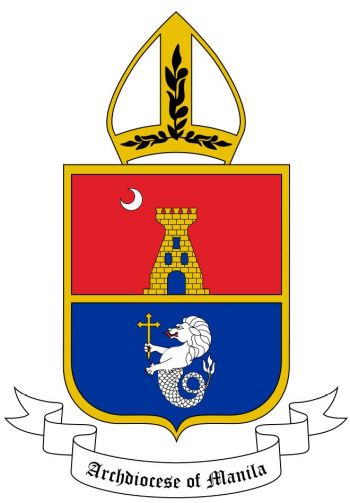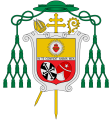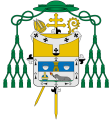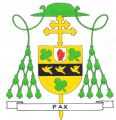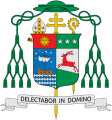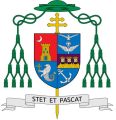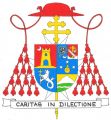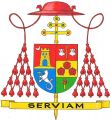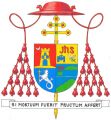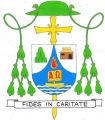Archdiocese of Manila: Difference between revisions
Knorrepoes (talk | contribs) m (Text replacement - "↵↵'''" to "'''") |
Knorrepoes (talk | contribs) m (Text replacement - "{{religion}}↵{{media}} " to "{{religion}} {{ph}} {{media}} ") |
||
| Line 90: | Line 90: | ||
{{religion}} | {{religion}} | ||
{{ph}} | |||
{{media}} Info from the Styleguide of the Archdiocese of Manila | {{media}} Info from the Styleguide of the Archdiocese of Manila | ||
[[Category:Ecclesiastical heraldry of the Philippines]] | [[Category:Ecclesiastical heraldry of the Philippines]] | ||
[[Category:Roman Catholic archdioceses]] | [[Category:Roman Catholic archdioceses]] | ||
Revision as of 13:54, 7 August 2023
ARCHDIOCESE OF MANILA (Archidioecesis Manilensis)
Country : Philippines
Denomination : Roman Catholic
Established : 1579 as Diocese of Manila
Elevated to Archdiocese in 1595
Official blazon
Origin/meaning
The castle, taken from the original arms of the City of Manila, which originated from the arms of the Kingdom of Castile, was changed into a tower to represent God Himself, who is called in Psalm 60:4 “turris fortis contra inimicum” (a tower of strength against the enemy). The three windows make the tower reflect the Blessed Trinity: Father, Son, and Holy Spirit, three Persons in one God.
The silver crescent placed in the upper right-hand corner of the shield represents the Immaculate Conception, patroness of the Manila Cathedral, the Archdiocese of Manila, and of the entire Philippines. The symbol of the moon comes from Revelation 12:1 - “A great sign appeared in the sky, a woman clothed with the sun, with the moon under her feet, and on her head a crown of twelve stars.”
The sea lion historically called the Ultramar (in Latin ultra means from beyond and mar connotes the sea) was a distinctive emblem given by the King of Spain to the City of Manila as an overseas colony. The lion is derived from the arms of the Kingdom of León, with a tail of a fish instead of legs to identify Manila as a territory overseas. The sword held by the sea lion was substituted with a cross fitchée which is a cross whose base is pointed. Crosses of this description are said to have been carried by the early Christians on their pilgrimages so that they might readily be fixed in the ground while performing their devotions. Another reason for the substitution of the sword by the cross is the policy enshrined in the Constitution of the Philippine Republic: “The Philippines renounces war as an instrument of national policy, adopts the generally accepted principles of international law as part of the law of the land...” (Art. II, Sec. 2). By this, the Filipino faithful proclaim that they cannot “glory except in the cross of our Lord Jesus Christ” (Gal. 6:14).
Surmounting the shield is a miter, a symbol of rank and responsibility for prelates, representing the jurisdiction of the Archdiocese of Manila as a diocese established by the Pope and given to the care of our Archbishop. The miter is also a sign of our final victory in heaven, its symbolism arising from St. Paul’s analogy: “I have fought the good fight, I have finished the race, I have kept the faith. From now on the crown of righteousness awaits me “ (2 Tim. 4:7-8).
Arms of Archishops
- No image
Ignacio de Santibáñez (1595-1598)
- No image
Miguel de Benavides (1602-1605)
- No image
Diego Vázquez de Mercado (1608-1616)
- No image
Miguel García Serrano (1618 - 1629)
- No image
Hernando Guerrero Cabrera (1634 - 1641)
- No image
Fernando Montero de Espinosa (1646 - 1648)
- No image
Miguel de Poblete Casasola (1649 - 1667)
- No image
Juan López (1672 -1674)
- No image
Felipe Fernández Pardo, (1680 - 1689)
- No image
Diego Camacho y Ávila (1695 - 1704)
- No image
Francisco de la Cuesta (1704 - 1723)
- No image
Carlos Bermúdez de Castro (1724 - 1729)
- No image
Juan Ángel Rodríguez (1731 - 1742)
- No image
Pedro José Manuel Martínez de Arizala (1744 -1755)
- No image
Manuel Antonio Rojo del Río (1757 - 1764)
- No image
Basilio Tomás Sancho Hernando (1766 - 1787)
- No image
Juan Antonio Gallego y Orbigo (1788 - 1797)
- No image
Juan Antonio Zulaibar (1804 - 1824 )
- No image
Hilarión Díez Fernández ( 1826 - 1829)
- No image
José Maria Seguí Molas (1830 - 1845)
- No image
José de Aranguren (1846 - 1861)
- No image
Gregorio Melitón Martínez Santa Cruz (1861 - 1875)
Pedro Payo y Piñeiro (1876 - 1889)
Bernardino Nozaleda y Villa (1889 - 1902)
Jeremiah James Harty (1903 - 1916)
Michael James O'Doherty (1916 - 1949)
Gabriel Martelino Reyes (1949 - 1952 )
Rufino Jiao Santos (1953 - 1973)
Jaime Lachica Sin (1974 - 2003)
Gaudencio Borbón Rosales (2003 - 2011)
Luis Antonio Tagle (2011-2019)
Jose Advincula (2021-present)
Arms of Auxiliary Bishops
- No image
Ginés Barrientos (1680-1698)
- No image
Jose Maria Segui Molas (1829-1830)
- No image
William Finnemann (1929-1936)
- No image
Cesar Maria Guerrero y Gutierrez (1937-1949)
- No image
Rufino Jiao Santos (1947-1953)
- No image
Vicente Posada Reyes (1950-1961)
- No image
Hernando Izquierdo Antiporda (1954-1975)
- No image
Pedro Bantigue y Natividad (1961-1967)
- No image
Bienvenido M. Lopez (1966-1995)
- No image
Artemio G. Casas (1968-1974)
- No image
Amado Paulino y Hernandez (1969-1985)
- No image
Gaudencio Borbon Rosales (1974-1982)
- No image
Oscar Valero Cruz (1976-1978)
- No image
Protacio G. Gungon (1977-1983)
- No image
Leonardo Legaspi (1977-1984)
- No image
Manuel C. Sobreviñas (1979-1993)
- No image
Gabriel V. Reyes (1981-1992)
- No image
Teodoro J. Buhain. (1983-2003)
- No image
Teodoro Bacani (1984-2002)
- No image
Leoncio L. Lat (1985-1992)
- No image
Ramon Arguelles (1993-1995)
- No image
Crisostomo A. Yalung (1994-2001)
- No image
Rolando Joven Tria Tirona (1994-1996)
- No image
Jesse E. Mercado (1997-2002)
- No image
Socrates Buenaventura Villegas (2001-2004)
- No image
Bernardino C. Cortez (2004-2014)
Broderick Soncuaco Pabillo (2006-present)
Religious or Ecclesiastical heraldry portal
This page is part of the Ecclesiastical heraldry portal |
Heraldry of the World |
|
Catholic heraldry
|
Other Christian churches Other religions
|
| Heraldry of the World |
| Philippine heraldry portal |
Contact and Support
Partners:
Your logo here ?
Contact us
© since 1995, Heraldry of the World, Ralf Hartemink 
Index of the site Info from the Styleguide of the Archdiocese of Manila
